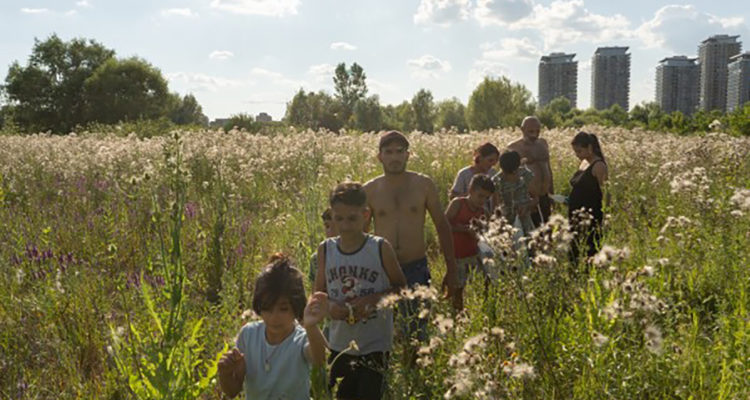The Romanian documentary “Acasa, My Home” explores life outside the margins of society. The idea of living off the grid, raising kids, hunting and fishing and swimming and camping might be escapist, but it’s steeped in current realities. Who hasn’t felt the need to run away in this confusing and terrifying year?
READ MORE: The 25 Best Films Of 2021 We’ve Already Seen
The stars of this fantasy, the Enache family, still have a few responsibilities: the care of Zane, their pet pig, as well as Gica, their sick patriarch. But they have less interest in their duties than they do in their surroundings, whether in a field or stream. There’s no shortage of nature and beauty in Lake Vacaresti, a stretch of abandoned marsh where the Enache’s live freely and harmoniously off the land, the kids fishing and swimming in the lake, the boys roughhousing on the shore like a pack of puppies.
READ MORE: 10 Movies To See In January: ‘Pieces Of A Woman,’ ‘One Night In Miami’ & More
While Gica might not shield his kids from some realities of life– the city beyond the marsh for instance– he does choose to keep them away from other things, like strip malls, fast food, Twitter and other indulgences of modern life. Everyone chooses how they are going to raise their kids, and Gica’s choices are thrown under a microscope when Social Services takes his family away from Lake Vacaresti.
READ MORE: The 100 Most Anticipated Films Of 2021
“Acasa, My Home” is written and directed by Radu Ciorniciuc, a veteran journalist, recently best known for his work at The Guardian. This is his directorial debut, and the film is almost strange in how softly radiant and observant it is. That’s due in large part to Ciorniciu’s access to the Enaches, who he filmed over the course of four years. After gaining their trust, he followed them everywhere–even into a loud and curious place called “civilization.”
The misunderstandings and confusions of these forest kids who find themselves in the big wide world of strip malls and freeways lead to plenty of hilarious, yet profound, moments. All the survivalist training in the world couldn’t prepare them for school or phones or haircuts, revealing the gaps in Gica’s parenting. But “Acasa, My Home” so convincingly immerses you in his perspective, that his way is the only way (especially compared to the ways of the city).
The kids learn to read and write and do math, and learn the rules of the game, at the same time as their father is forced to pay rent and work odd jobs. He wants to return to the lake. So does second-oldest son Rica, who, in a tearful confession to the camera–one of many devastating, heartbreaking scenes late in the doc– likens the city to a prison. “Even the food tastes better in Vacaresti,” he says. “We should go back.”
But this is not one of those movies where everything goes back to normal and things fall neatly in place. Instead, “Acasa, My Home” explores how bureaucracy sucks the life out of families, one by one, by turning them into 40-hour-a-week workhorses. It ruminates powerfully on the meaning of freedom, positing that our only chance at control may be a place far, far away from civilization, a place where the reeds sway gently and the fish are plenty.
It’s a place we can all run to. Few, however, actually do. [B]

